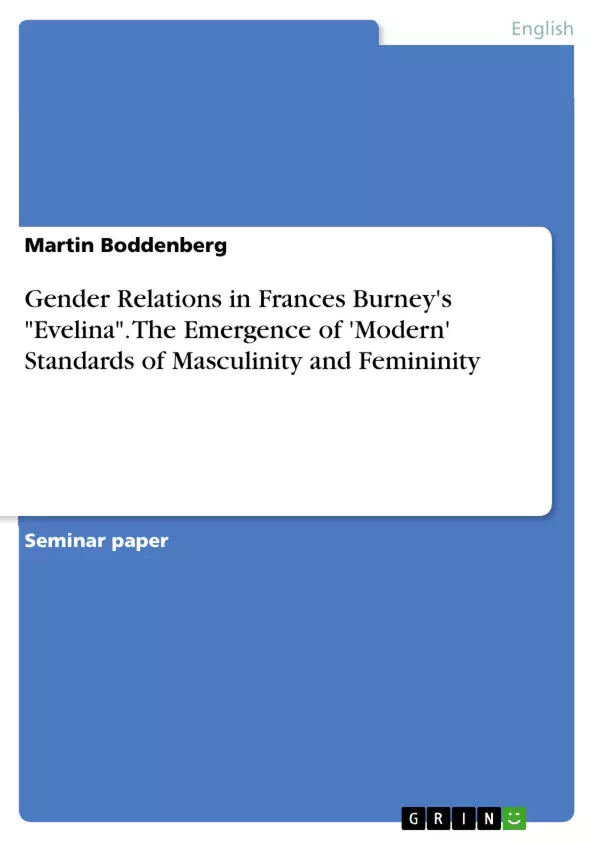I want to focus my examination on the two protagonists Evelina and Lord Orville, but will also take a look at Mr. Villars, Captain Mirvan, Sir Clement, Madam Duval and Mrs. Selwyn. The aim of this essay is to show that the gender relations depicted in the novel are not as unbalanced as one might think at first sight.
The eighteenth century is an interesting era, because it can be considered a transition period between the Renaissance, when gender relations were slowly beginning to change, and the nineteenth century, when laws improved women's situation. The focus on the seventeenth and nineteenth century literature among literary scholars has left the eighteenth century a bit underrepresented. Although many things changed or had already changed in the eighteenth century, we can still trace patriarchal structures and ways of thinking going back until antiquity. “Evelina” was first published in 1778, in the late eighteenth century.
Inhaltsverzeichnis (Table of Contents)
- Introduction
- Main Part
- Conclusion
Zielsetzung und Themenschwerpunkte (Objectives and Key Themes)
This essay aims to analyze the gender relations depicted in Frances Burney's novel "Evelina," specifically focusing on the protagonists Evelina and Lord Orville, as well as other important characters. The essay argues that while patriarchal structures are evident in the eighteenth century, Evelina's journey throughout the novel suggests a growing sense of emancipation.
- The evolution of gender relations in the late eighteenth century
- The portrayal of different models of masculinity and femininity in the novel
- The influence of conduct literature on Evelina's character development
- The impact of social class and status on gender roles and expectations
- The complexities of power dynamics and the search for authenticity in relationships
Zusammenfassung der Kapitel (Chapter Summaries)
- Introduction: This chapter provides a historical context for the novel, highlighting the evolving gender relations of the late eighteenth century. It discusses the changing social norms and the ongoing influence of patriarchal structures.
- Main Part: This section delves into the analysis of the characters and their interactions, exploring the complex dynamics of gender relations in the novel. It examines the protagonists' personalities and their evolving perspectives on love, marriage, and societal expectations.
Schlüsselwörter (Keywords)
The essay explores key concepts and themes related to gender roles, societal expectations, conduct literature, patriarchal structures, social class, and the development of individuality in the late eighteenth century. It examines the influence of these factors on the characters' experiences and choices within the context of Frances Burney's "Evelina."
Frequently Asked Questions
What is the central theme of this essay on Frances Burney's "Evelina"?
The essay explores gender relations in the late 18th century, specifically the emergence of modern standards of masculinity and femininity through the novel's characters.
Which characters are the primary focus of the analysis?
The analysis focuses on the protagonists Evelina and Lord Orville, while also considering Mr. Villars, Captain Mirvan, Sir Clement, Madam Duval, and Mrs. Selwyn.
Why is the 18th century described as a "transition period" for gender relations?
It is seen as a bridge between the Renaissance and the 19th century, where patriarchal structures from antiquity persisted even as modern ideas of emancipation began to surface.
What role does "conduct literature" play in the novel?
The essay examines how conduct literature (books teaching social behavior) influenced Evelina’s character development and the societal expectations placed upon her.
Does the essay argue that gender relations in the novel are completely unbalanced?
No, the author aims to show that the relations are more complex and not as one-sidedly patriarchal as they might appear at first glance.
- Quote paper
- Martin Boddenberg (Author), 2016, Gender Relations in Frances Burney's "Evelina". The Emergence of 'Modern' Standards of Masculinity and Femininity, Munich, GRIN Verlag, https://www.grin.com/document/334358



